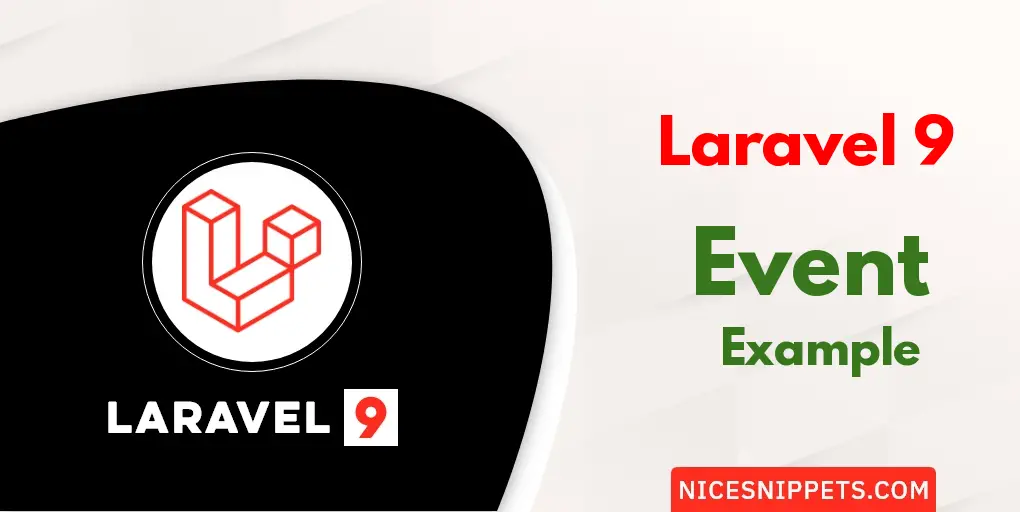10-Apr-2023
.
Admin

Hi Guys,
Today, I will learn you how to create event example in laravel 9. We will show a simple event example in laravel 9. Events provide a simple observer implementation, allowing you to subscribe and listen for events in your application. In these posts, you can learn how to create event for email send in your laravel 9 application. event is very helping to create proper programming way. First, create event using below command.
Step 1: Download Laravel
Let us begin the tutorial by installing a new laravel application. if you have already created the project, then skip following step.
composer create-project laravel/laravel example-app
Step 2: Add Event
php artisan make:event SendMail
Next, you can see file in this path
app/Events/SendMail.php
<?php
namespace App\Events;
use Illuminate\Broadcasting\Channel;
use Illuminate\Broadcasting\InteractsWithSockets;
use Illuminate\Broadcasting\PresenceChannel;
use Illuminate\Broadcasting\PrivateChannel;
use Illuminate\Contracts\Broadcasting\ShouldBroadcast;
use Illuminate\Foundation\Events\Dispatchable;
use Illuminate\Queue\SerializesModels;
class SendMail
{
use Dispatchable, InteractsWithSockets, SerializesModels;
public $userId;
/**
* Create a new event instance.
*
* @return void
*/
public function __construct($userId)
{
$this->userId = $userId;
}
/**
* Get the channels the event should broadcast on.
*
* @return \Illuminate\Broadcasting\Channel|array
*/
public function broadcastOn()
{
return new PrivateChannel('channel-name');
}
}
Step 3: Add Listener
Now, I need to create event listener for "SendMail" event. So create event listener using bellow command.
php artisan make:listener SendMailFired --event="SendMail"
In this event listener we have to handle event code, i mean code of mail sending, Before this file you have to check your mail configration, If you did not set then you can set this way :How to set gmail configration for mail in Laravel 8?.
app/Listeners/SendMailFired.php.
<?php
namespace App\Listeners;
use App\Events\SendMail;
use Illuminate\Contracts\Queue\ShouldQueue;
use Illuminate\Queue\InteractsWithQueue;
use App\Models\User;
use Mail;
class SendMailFired
{
/**
* Create the event listener.
*
* @return void
*/
public function __construct()
{
//
}
/**
* Handle the event.
*
* @param SendMail $event
* @return void
*/
public function handle(SendMail $event)
{
$user = User::find($event->userId)->toArray();
Mail::send('eventMail', $user, function($message) use ($user) {
$message->to($user['email']);
$message->subject('Event Testing');
});
}
}
Step 4: Add in Providers
Now we require to register event on EventServiceProvider.php file so, open app/Providers/EventServiceProvider.php and copy this code and put in your file.
<?php
namespace App\Providers;
use Illuminate\Auth\Events\Registered;
use Illuminate\Auth\Listeners\SendEmailVerificationNotification;
use Illuminate\Foundation\Support\Providers\EventServiceProvider as ServiceProvider;
use Illuminate\Support\Facades\Event;
use App\Events\SendMail;
use App\Listeners\SendMailFired;
class EventServiceProvider extends ServiceProvider
{
/**
* The event listener mappings for the application.
*
* @var array
*/
protected $listen = [
Registered::class => [
SendEmailVerificationNotification::class,
],
SendMail::class => [
SendMailFired::class,
],
];
/**
* Register any events for your application.
*
* @return void
*/
public function boot()
{
//
}
}
Step 5: Add Route
Now In This Setp, we are create route.
<?php
use App\Http\Controllers\EventController;
/*
|--------------------------------------------------------------------------
| Web Routes
|--------------------------------------------------------------------------
|
| Here is where you can register web routes for your application. These
| routes are loaded by the RouteServiceProvider within a group which
| contains the "web" middleware group. Now create something great!
|
*/
Route::get('/event', [EventController::class, 'index'])->name('event.index');
Step 6: Add Controller
At Last we are ready to use event in our controller file. so use this way:
app/Http/Controllers/EventController.php
<?php
namespace App\Http\Controllers;
use Illuminate\Http\Request;
use Event;
use App\Events\SendMail;
class EventController extends Controller
{
/**
* Write code on Method
*
* @return response()
*/
public function index()
{
Event::dispatch(new SendMail(1));
dd('hi');
}
}
Run Laravel App:
All steps have been done, now you have to type the given command and hit enter to run the laravel app:
php artisan serve
Now, you have to open web browser, type the given URL and view the app output:
http://localhost:8000/event
It will help you...
#Laravel 9